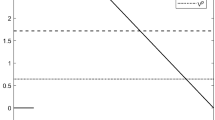Summary
In this paper, we show that contestants’ behavior in sequential-move tournaments strictly differs from the behavior in simultaneous-move ones. In a sequential-move tournament, players choose different effort levels even in the case of homogeneity, whereas in the simultaneous-move tournament homogeneous players always behave symmetrically. Moreover, in the sequential setting the first-moving player may choose a preemptively high effort level so that the second mover drops out of the competition under certain conditions. In order to avoid such behavior, the organizer of the tournament should choose a rather moderate spread between winner and loser prize as best response.
Zusammenfassung
Im vorliegenden Beitrag wird gezeigt, dass sich das Verhalten von Teilnehmern in Turnieren mit sequentieller Zugfolge deutlich von demjenigen in Standardturnieren unterscheidet, in welchen die Akteure ihre Anstrengungen simultan wählen. Zum einen entscheiden sich die Akteure im sequentiellen Fall selbst dann für unterschiedliche Anstrengungen, wenn sie homogen sind. Zum anderen kann es unter bestimmten Bedingungen dazu kommen, dass der Erstziehende eine derart präventiv hohe Anstrengung wählt, dass der nachfolgende Akteur aus dem Wettbewerb aussteigt. Um ein solches Problem zu vermeiden, sollte der Turnierveranstalter darauf achten, dass Gewinner- und Verliererpreis nicht zu stark auseinanderfallen.
Similar content being viewed by others
References
Antle, R. and A. Smith (1986), An empirical investigation of the relative performance evaluation of corporative executives. Journal of Accounting Research 24, 1–39.
Baik, K.H. (1998), Difference-form contest success functions and effort levels in contests. European Journal of Political Economy 14, 685–701.
Baker, G.P., Gibbs, M. and B. Holmström (1994), The wage policy of a firm, Quarterly Journal of Economics 109, 921–955.
Chen, K.-P. (2003), Sabotage in promotion tournaments. Journal of Law, Economics, and Organization 19, 119–140.
Dixit, A. (1987), Strategic behavior in contests. American Economic Review 77, 891–898.
Ehrenberg, R.G., and M.L. Bognanno (1990a), Do tournaments have incentive effects? Journal of Political Economy 98, 1307–1324.
Green, J.R., and N.L. Stokey (1983), A comparison of tournaments and contracts. Journal of Political Economy 91, 349–364.
Grund, C. and D. Sliwka (2005), Envy and compassion in tournaments. Journal of Economics and Management Strategy 14, 187–207.
Hall, S., Szymanski, S. and A.S. Zimbalist (2002), Testing causality between team performance and payroll. Journal of Sports Economics 3, 149–168.
Jost, P.-J. and M. Kräkel (2005), Preemptive behavior in sequential-move tournaments with heterogeneous agents. Economics of Governance 6, 245–252.
Konrad, K.A. (2000), Sabotage in rent-seeking contests. Journal of Law, Economics, and Organization 16, 155–165.
Kräkel, M. (2000), Relative deprivation in rank-order tournaments. Labour Economics 7, 385–407.
Kräkel, M. (2005). Helping and sabotaging in tournaments. International Game Theory Review 7, 211–228.
Lazear, E.P. (1989), Pay equality and industrial politics. Journal of Political Economy 97, 561–580.
Lazear, E.P., and S. Rosen (1981), Rank-order tournaments as optimum labor contracts. Journal of Political Economy 89, 841–864.
Leininger, W. (1991), Patent competition, rent dissipation, and the persistence of monopoly: the role of research budgets. Journal of Economic Theory 53, 146–172.
Leininger, W., and C.-L. Yang (1994), Dynamic rent-seeking games. Games and Economic Behavior 7, 406–427.
Lynch, J.G. and J.S. Zax (2000), The rewards to running: prize structure and performance in professional road racing. Journal of Sports Economics 1, 323–340.
Mantrala, M.K., Krafft, M. and B. Weitz (2000), An empirical examination of economic rationales for companies’ use of sales contests. GEABA Discussion Paper # DP 00-07. German Economic Association of Business Administration.
Murphy, K.J. (1992), Performance measurement and appraisal: motivating managers to identify and reward performance,” in Bruns, W.J. Jr. (Ed.): Performance measurement, evaluation, and incentives, Boston, 37–62.
Nalebuff, B. J., and J. E. Stiglitz (1983), Prizes and incentives: toward a general theory of compensation and competition. Bell Journal of Economics 14, 21–43.
Rosen, S. (1986), Prizes and incentives in elimination tournaments. American Economic Review 76, 701–715.
Szymanski, S. (2003), The economic design of sporting contests. Journal of Economic Literature 41, 1137–1187.
Weimann, J., Yang, C.-L., and C. Vogt (2000), An experiment on sequential rent-seeking. Journal of Economic Behavior & Organization 41, 405–426.
Author information
Authors and Affiliations
Corresponding author
Additional information
We would like to thank two anonymous referees for helpful comments. M. Kräkel is grateful for financial support by the Deutsche Forschungsgemeinschaft (DFG), project no. SFB/TR 15 (“Governance and the Efficiency of Economic Systems”).
Rights and permissions
About this article
Cite this article
Jost, PJ., Kräkel, M. Preemption in rank-order tournaments. Z. Betriebswirtsch 77, 1293–1314 (2007). https://doi.org/10.1007/s11573-007-0326-7
Received:
Published:
Issue Date:
DOI: https://doi.org/10.1007/s11573-007-0326-7




